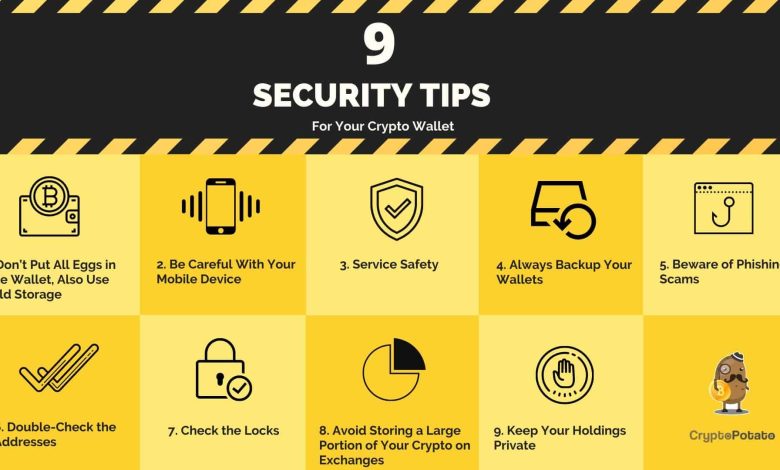How to Secure Your Crypto Wallet from Hackers

- Understanding the importance of securing your crypto wallet
- Common tactics used by hackers to target crypto wallets
- Best practices for creating a strong password for your wallet
- Utilizing two-factor authentication to enhance wallet security
- The risks of storing your crypto assets on exchanges
- Tips for safely storing your private keys offline
Understanding the importance of securing your crypto wallet
Understanding the significance of securing your cryptocurrency wallet is crucial in safeguarding your digital assets from potential hackers. By taking proactive measures to protect your wallet, you can mitigate the risk of unauthorized access and potential loss of funds.
One of the key aspects of securing your crypto wallet is to use a strong and unique password. Avoid using easily guessable passwords or reusing passwords from other accounts, as this can make it easier for hackers to gain access to your wallet. Additionally, consider enabling two-factor authentication (2FA) for an extra layer of security.
Another important step in securing your crypto wallet is to regularly update your wallet software. Developers often release updates to address security vulnerabilities, so staying up to date with the latest version can help protect your funds. Additionally, be cautious of phishing attempts and only download wallet software from official sources.
It is also recommended to store your private keys offline in a secure location, such as a hardware wallet or a paper wallet. By keeping your private keys offline, you can reduce the risk of them being compromised by online threats. Remember to keep backups of your keys in case of loss or damage.
Overall, understanding the importance of securing your crypto wallet is essential for protecting your digital assets. By following best practices such as using strong passwords, enabling 2FA, updating your software, and storing your private keys offline, you can help ensure the safety of your funds in the volatile world of cryptocurrency.
Common tactics used by hackers to target crypto wallets
There are various **tactics** that **hackers** use to target **crypto wallets** and steal **cryptocurrency**. It is essential to be aware of these **methods** to **protect** your **digital assets** effectively.
- Phishing **attacks**: **Hackers** often use **phishing** emails or **websites** to trick **crypto wallet** owners into **revealing** their **private keys** or **passwords**. Be cautious of **unsolicited** emails or **links** asking for **personal information**.
- Malware **infections**: **Hackers** can **infect** your **computer** or **mobile device** with **malicious software** designed to **steal** your **crypto wallet** information. **Regularly** scan your **devices** for **malware** and **keep** your **security software** up to date.
- **Social engineering**: **Hackers** may try to **trick** you into **disclosing** your **private keys** or **seed phrases** through **social media** or **phone calls**. **Never** share your **sensitive information** with **strangers**.
- **Brute force attacks**: **Hackers** use **automated** **software** to **guess** your **password** or **private keys**. **Use** **complex** **passwords** and **enable** **two-factor authentication** to **prevent** **brute force attacks**.
- **Physical theft**: **Hackers** may try to **steal** your **hardware wallet** or **paper wallet** containing your **crypto assets**. **Keep** your **physical wallets** in a **secure** **location** and **backup** your **private keys** in a **safe place**.
Best practices for creating a strong password for your wallet
When it comes to securing your crypto wallet from hackers, creating a strong password is crucial. Here are some best practices to follow:
- Use a combination of uppercase and lowercase letters, numbers, and special characters.
- Avoid using easily guessable information such as your name, birthdate, or common words.
- Make sure your password is at least 12 characters long to increase its complexity.
- Consider using a passphrase instead of a single word for added security.
- Regularly update your password and avoid reusing it for multiple accounts.
By following these guidelines, you can significantly reduce the risk of unauthorized access to your crypto wallet and protect your digital assets.
Utilizing two-factor authentication to enhance wallet security
Enhancing the security of your crypto wallet is crucial in protecting your digital assets from hackers. One effective way to strengthen the security of your wallet is by utilizing two-factor authentication (2FA). 2FA adds an extra layer of security by requiring users to provide two different authentication factors before gaining access to their wallet.
When setting up 2FA for your crypto wallet, you can choose from various authentication methods such as SMS verification, email verification, or authenticator apps. By enabling 2FA, even if a hacker manages to obtain your password, they would still need the second factor to access your wallet, making it significantly more challenging for them to breach your security.
It is essential to enable 2FA on all your crypto wallet accounts to ensure maximum security. By taking this simple step, you can significantly reduce the risk of unauthorized access and protect your digital assets from potential threats. Remember, when it comes to securing your crypto wallet, it’s better to be safe than sorry.
The risks of storing your crypto assets on exchanges
Storing your crypto assets on exchanges can pose significant risks to the security of your funds. When you leave your cryptocurrencies on an exchange, you are essentially trusting a third party to safeguard your assets. This means that if the exchange gets hacked, your funds could be at risk of being stolen. Additionally, exchanges can sometimes experience technical issues or even go bankrupt, leading to potential loss of your assets.
Furthermore, when you store your crypto assets on an exchange, you may not have full control over your private keys. This means that you are relying on the exchange to manage your keys, which could make you vulnerable to security breaches. It is always recommended to store your cryptocurrencies in a secure wallet where you have full control over your private keys.
By keeping your crypto assets on exchanges, you are also missing out on the benefits of decentralization. Cryptocurrencies were designed to be decentralized, meaning that they are not controlled by any single entity. By storing your assets on exchanges, you are centralizing your funds and potentially exposing them to more risks.
Tips for safely storing your private keys offline
When it comes to securing your crypto wallet from hackers, one of the most important steps you can take is to store your private keys offline. Here are some tips to help you do so safely:
- Consider using a hardware wallet to store your private keys offline. Hardware wallets are physical devices that store your keys securely and are not connected to the internet, making them less vulnerable to hacking.
- Make sure to create a backup of your private keys and store them in a secure location. This will ensure that you can still access your funds even if you lose your primary storage device.
- Avoid storing your private keys on your computer or any other device that is connected to the internet. Hackers can easily gain access to these devices and steal your keys.
- Use a secure password to protect your offline storage device. Make sure to choose a password that is difficult to guess and avoid using common phrases or words.
- Consider using a passphrase in addition to your password for an extra layer of security. A passphrase is a series of words that you can use to encrypt your private keys and make them even more secure.
By following these tips, you can help ensure that your private keys are stored safely offline and protect your crypto wallet from hackers.



